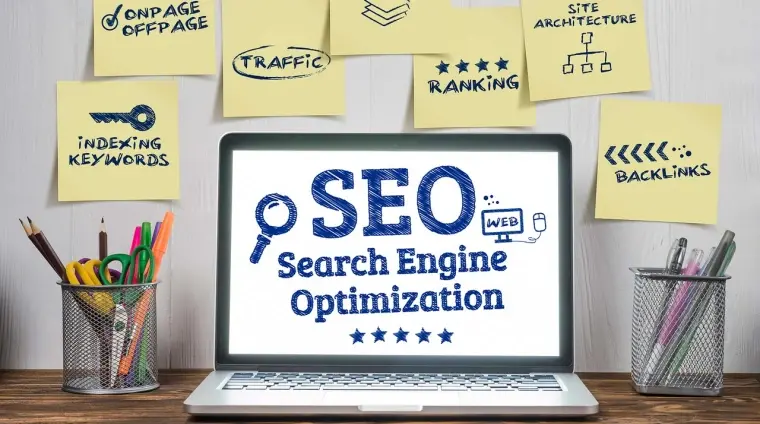When it comes to marketing in the digital age, search engine optimization (SEO) plays a crucial role in enhancing your brand’s visibility and online presence. By implementing effective SEO strategies, you can increase your website’s rankings on search engine results pages (SERPs) and attract more organic traffic to your site.
But what exactly is SEO, and how can it benefit your marketing efforts? In this article, we will explore the importance of search engine optimization for marketing success and provide you with valuable insights on how to optimize your website, content, and online campaigns to achieve maximum visibility.
Key Takeaways:
- Search engine optimization (SEO) is essential for marketing success in the digital era.
- Effective SEO strategies improve your brand’s visibility and online presence.
- Optimizing your website, content, and online campaigns can drive more organic traffic to your site.
- Understanding SEO principles is crucial before implementing them into your marketing strategy.
- Stay tuned as we dive into key elements of SEO, website content optimization, link building, mobile optimization, local SEO, and measuring SEO success.
Understanding Search Engine Optimization
Before diving into the world of digital marketing, it is crucial to have a clear understanding of search engine optimization (SEO) and its role in driving online success. SEO refers to the set of techniques and strategies used to improve a website’s visibility on search engine results pages. In this section, we will provide an overview of SEO principles and explore how they apply to marketing strategies.
SEO involves optimizing various aspects of a website to ensure it ranks higher on search engine result pages. By implementing SEO best practices, businesses can increase their organic traffic, attract targeted audiences, and ultimately improve their online presence. With search engines constantly evolving their algorithms, understanding the fundamental principles of SEO is essential for marketers looking to drive visibility and engagement.
Key Components of Search Engine Optimization
SEO encompasses several components that work together to enhance a website’s visibility and relevance to search engines. Key components of SEO include:
- Keyword Research: Identifying relevant keywords and phrases that align with your target audience’s search queries.
- On-Page Optimization: Optimizing website elements such as titles, headings, meta tags, and content to align with target keywords.
- Off-Page Optimization: Building high-quality backlinks and establishing the website’s authority and reputation through external platforms.
- Technical SEO: Optimizing technical aspects of a website, including site speed, mobile-friendliness, and crawlability.
By focusing on these key components of SEO, marketers can create a solid foundation for their digital marketing efforts, ensuring their website is optimized for maximum visibility and engagement.
“SEO is not just about appeasing search engines; it’s about enhancing user experience and delivering valuable content.”
Effective SEO practices go hand in hand with user-centric design and content strategies. It’s vital to create informative, engaging, and relevant content that not only satisfies search intent but also provides value to the target audience. Combining SEO with user experience optimization ensures that websites rank well, attract organic traffic, and convert visitors into customers.
The Evolving Landscape of SEO
As search engines continue to evolve, so too does the SEO landscape. With algorithm updates and advancements in machine learning, search engines are becoming more adept at understanding user intent and delivering highly relevant search results. Marketers must stay informed about the latest SEO trends and adapt their strategies to align with these changes.
Key Elements of SEO for Marketing
When it comes to optimizing your digital marketing strategy, understanding the key elements of SEO is essential. By incorporating effective marketing strategies, you can significantly enhance your brand’s online visibility and drive valuable organic traffic to your website. In this section, we will explore the essential components that make up a successful SEO strategy for marketing.
Keyword Research
One of the fundamental aspects of SEO for marketing is conducting comprehensive keyword research. By identifying the relevant keywords and phrases your target audience is using, you can optimize your website content and marketing campaigns accordingly. Keyword research ensures that your brand appears in search engine results when potential customers are actively looking for the products or services you offer.
On-Page Optimization
On-page optimization refers to the process of optimizing elements on your website to improve its visibility in search engine rankings. This includes optimizing meta tags, headings, URLs, and page content with relevant keywords and providing a seamless user experience. By implementing on-page optimization techniques, you can create an SEO-friendly website that is easily crawlable by search engines, resulting in improved organic rankings.
Content Creation and Marketing
Developing high-quality content that aligns with your target audience’s needs and interests is crucial for SEO success in marketing. Creating informative blog posts, articles, videos, and other types of content not only establishes your brand’s expertise but also attracts valuable backlinks and social shares. By incorporating relevant keywords naturally into your content, you can optimize it for search engines and increase its visibility to potential customers.
Link Building
Link building plays a significant role in SEO for marketing. By obtaining high-quality backlinks from authoritative websites, you not only drive referral traffic but also enhance your brand’s credibility and authority in the eyes of search engines. Building relationships with influencers, guest posting on relevant industry blogs, and participating in online communities are effective strategies to acquire valuable backlinks and boost your SEO efforts.
User Experience and Mobile Optimization
Providing a seamless user experience and optimizing your website for mobile devices are crucial elements of SEO for marketing. With the increasing number of mobile users, search engines prioritize mobile-friendly websites in their rankings. By ensuring your website is responsive, easy to navigate, and loads quickly on mobile devices, you can enhance user engagement, reduce bounce rates, and improve your search engine rankings.
Social Media Integration
Social media integration is a powerful marketing strategy that can complement your overall SEO efforts. By sharing your website content and engaging with your audience through social media platforms, you can increase brand awareness, drive traffic, and attract valuable backlinks. Additionally, social signals, such as likes, shares, and comments, can indirectly influence your search engine rankings, making social media an important component of your SEO strategy.
To summarize, incorporating these key elements of SEO for marketing into your overall strategy can significantly improve your brand’s online visibility, drive organic traffic, and boost your marketing success. By focusing on keyword research, on-page optimization, content creation, link building, user experience, mobile optimization, and social media integration, you can set your brand up for long-term SEO success.
Optimizing Website Content for SEO
When it comes to improving your search engine rankings, optimizing your website content is key. By focusing on website content optimization, you can make your web pages more appealing to both visitors and search engines. Here are some techniques to ensure your content is keyword-rich and engaging, boosting your chances of higher visibility:
1. Conduct Keyword Research
Start with thorough keyword research to identify the terms and phrases your target audience is searching for. Use tools like Google Keyword Planner or SEMrush to discover high-volume keywords that are relevant to your industry. Integrate these keywords naturally throughout your content to increase its relevance and improve your chances of ranking higher in search engine results.
2. Create Engaging Content
While keywords are important, it’s also crucial to create content that engages and resonates with your audience. Develop informative and valuable content that answers their questions and provides solutions. By offering unique and compelling content, you can encourage visitors to stay on your site longer, reducing bounce rates and signaling to search engines that your content is valuable.
“Great website content isn’t just about stuffing keywords. It’s about creating value for your audience and building a trusting relationship.”
– Marketing Expert
3. Optimize Meta Tags
Meta tags, including meta titles and descriptions, play a crucial role in website content optimization. Craft compelling meta titles that include relevant keywords and accurately describe the page’s content. Similarly, write meta descriptions that entice users to click through to your website while incorporating keywords in a natural manner.
4. Utilize Heading Tags
Heading tags, such as H1, H2, and H3, not only structure your content but also provide a hierarchy for search engines to better understand your page. Incorporate your target keywords naturally into these heading tags to further emphasize their relevance to search engines.
5. Include Image Alt Tags
Images not only enhance the visual appeal of your website but can also contribute to SEO optimization. Use descriptive and keyword-rich alt tags for your images to make them more accessible to search engine crawlers. This practice can improve your chances of ranking in image search results and increase organic traffic to your site.

By implementing these website content optimization techniques, you can improve your search engine visibility and attract more organic traffic. Remember, creating valuable and engaging content should always be your priority, as it ensures a positive user experience and encourages repeat visits. Combined with smart optimization strategies, you’ll be well on your way to optimizing your website for SEO success.
Link Building and Off-Page SEO
When it comes to marketing success, link building and off-page SEO play a crucial role in boosting your brand’s visibility and authority. By understanding these strategies and implementing them effectively, you can establish your brand as a trusted resource, improve search engine rankings, and attract valuable organic traffic to your website.
The Power of Link Building
Link building refers to the process of acquiring high-quality backlinks from external websites. These backlinks act as “votes of confidence” for search engines, signaling the relevance and credibility of your content. The more authoritative and relevant websites linking back to your site, the higher your website’s authority and search engine rankings.
However, it’s important to note that not all backlinks are created equal. Quality matters over quantity. Focus on acquiring backlinks from reputable websites in your industry or niche. These authoritative backlinks will have a more significant impact on your SEO efforts.
Strategies for Effective Link Building
Here are some proven strategies to enhance your link building efforts:
- Create valuable and shareable content: Develop high-quality content that provides value to your target audience. When your content is informative, engaging, and relevant, other websites will naturally want to link to it.
- Guest posting: Contribute guest posts to authoritative websites in your industry. By providing valuable content to these platforms, you can earn backlinks while expanding your reach and establishing your expertise.
- Influencer outreach: Collaborate with influencers and thought leaders in your industry. When they share or link to your content, it can significantly boost your brand’s visibility and credibility.
- Broken link building: Identify broken links on relevant websites and reach out to the website owners to suggest replacing those broken links with links to your relevant content.
The Role of Off-Page SEO
Off-page SEO encompasses all the activities you undertake outside of your website to improve your search engine rankings. It involves optimizing your online presence and reputation on external platforms such as social media, online directories, and review sites.
Here are a few off-page SEO strategies to consider:
- Social media marketing: Establish a strong presence on social media platforms. Engage with your audience, share valuable content, and encourage social sharing. Social signals are an indication of your brand’s popularity and can positively impact your search engine rankings.
- Online reviews and ratings: Encourage your customers to leave reviews and ratings on platforms such as Google My Business, Yelp, and industry-specific directories. Positive reviews can enhance your brand’s reputation and influence search engine rankings.
- Brand mentions and citations: Monitor online mentions of your brand and ensure that your NAP (Name, Address, Phone Number) information is accurate and consistent across different platforms. This will help search engines recognize and associate your brand with relevant search queries.

By incorporating these link building and off-page SEO strategies into your marketing efforts, you can strengthen your brand’s online presence, increase your website’s authority, and ultimately drive more organic traffic and conversions.
Mobile Optimization for SEO
In today’s digital landscape, the use of mobile devices has skyrocketed. With more and more users relying on their smartphones and tablets to browse the internet and access information, it is crucial for businesses to optimize their websites for mobile devices. Mobile optimization not only improves user experience but also plays a significant role in search engine optimization (SEO).
When your website is optimized for mobile, it adjusts and adapts to different screen sizes, ensuring that your content is accessible and readable on all devices. This enhances the overall user experience and keeps visitors engaged, reducing bounce rates and increasing the likelihood of conversions.
From a search engine perspective, mobile optimization is vital. Search engines like Google prioritize mobile-friendly websites in their search results, as they aim to provide the best possible user experience. Therefore, having a mobile-optimized website can significantly improve your visibility and organic rankings.
There are several techniques and best practices for mobile optimization that you should consider. One of the crucial aspects is responsive web design, which ensures that your website layout adjusts automatically to fit different screen sizes. This eliminates the need to create separate mobile-specific websites and provides a consistent user experience across devices.
Another essential factor in mobile optimization is page loading speed. Mobile users expect fast-loading websites, and search engines take loading speed into account when ranking websites. To optimize your site’s loading speed for mobile, you can compress images, enable browser caching, and minify CSS and JavaScript files.
The Impact of Mobile Optimization on SEO
Mobile optimization not only improves user experience but also plays a significant role in search engine optimization (SEO).
Mobile optimization directly affects your website’s search engine visibility and rankings. When your website is mobile-friendly, it is more likely to rank higher in mobile search results, allowing you to reach a wider audience and attract more organic traffic.
Additionally, mobile optimization indirectly impacts your SEO efforts by improving user engagement metrics. When users have a positive experience on your mobile-optimized website, they are more likely to spend more time exploring your content, clicking on internal links, and sharing your pages on social media. These positive user signals signal search engines that your website provides valuable content and should be ranked higher in search results.
Furthermore, with the advent of mobile voice search, optimizing your website for mobile becomes even more critical. Voice search queries, such as those made using virtual assistants like Siri or Google Assistant, often deliver concise and locally relevant results. By ensuring your website is mobile-optimized, you increase your chances of appearing in voice search results and capturing valuable voice search traffic.
Stay Ahead with Mobile Optimization
As mobile usage continues to rise, mobile optimization remains an essential aspect of SEO and overall online success. By prioritizing mobile optimization techniques such as responsive design and fast loading speeds, you can enhance your website’s visibility, engage users, and outperform competitors in mobile search results.
Investing in mobile optimization is a strategic move that can yield long-term benefits. Whether you operate an e-commerce store, a local business, or a content-driven website, catering to mobile users is key to staying relevant and reaching your target audience effectively.
| Benefits of Mobile Optimization: | Key Mobile Optimization Techniques: |
|---|---|
| Improved user experience | Responsive web design |
| Increased search engine visibility | Fast loading speed |
| Higher organic rankings | Image compression |
| Positive user engagement | Browser caching |
| Targeting voice search traffic | Minification of CSS and JavaScript files |
Local SEO for Marketing Success
When it comes to marketing success, local SEO is the secret sauce that can make all the difference. In today’s digital age, consumers turn to search engines to find local businesses and services. By implementing effective local SEO strategies, you can ensure your brand is visible to potential customers in your area and drive more foot traffic to your physical locations.
Targeting Local Audiences
One of the primary goals of local SEO is to target audiences in specific geographic areas. By optimizing your website and online content with location-specific keywords, you can attract local customers who are actively searching for products or services in your area. This targeted approach increases the chances of converting these leads into loyal customers and drives marketing success.
Optimizing Business Listings
Another crucial aspect of local SEO is optimizing your business listings on various platforms, such as Google My Business, Yelp, and local directories. When potential customers search for businesses like yours, having accurate and up-to-date information in your listings increases the chances of appearing in relevant search results. Ensure your business name, address, phone number, and website URL are consistent across all platforms to maximize local SEO benefits.
Driving Foot Traffic
Local SEO is all about driving foot traffic to your physical locations. With the help of online reviews, local directories, and geo-targeted keywords, you can attract nearby customers who are more likely to visit your store or office. Make it easy for potential customers to find your location by including clear directions and accurate maps on your website and listings.
Implementing local SEO strategies allows you to tap into the immense potential of your local market. By targeting local audiences, optimizing your business listings, and driving foot traffic to your physical locations, you can achieve marketing success while establishing a strong presence in your community.
| Local SEO Benefits | Marketing Success |
|---|---|
| Increased visibility among local customers | Higher conversion rates |
| Improved online presence in your community | Enhanced brand reputation |
| More foot traffic to your physical locations | Increased sales and revenue |
In conclusion, local SEO plays a crucial role in achieving marketing success. By targeting local audiences, optimizing business listings, and driving foot traffic, businesses can gain a competitive edge in their communities. Embrace the power of local SEO and unlock the potential of your local market.
Measuring SEO Success and Analytics
Once you’ve implemented your SEO strategies, it’s essential to measure their success and analyze the data to guide your marketing efforts. Analytics play a crucial role in understanding how your website performs and improving your overall SEO strategy. In this section, we will discuss the key metrics and tools you can utilize to measure SEO success and gain valuable insights.
The Importance of Measuring SEO Success
Measuring SEO success allows you to assess the effectiveness of your strategies and make data-driven decisions. It helps you understand how your website is performing in search engine rankings, identify areas for improvement, and track the impact of your efforts over time. By analyzing the data, you can optimize your SEO tactics and continually enhance your online visibility.
Essential Metrics for Measuring SEO Success
When it comes to measuring SEO success, there are several key metrics you should pay attention to:
- Website Traffic: Tracking the number of visitors to your website is one of the fundamental metrics to evaluate SEO performance. Analyzing website traffic helps you gauge the overall visibility and reach of your brand.
- Keyword Rankings: Monitoring your keyword rankings allows you to see how well your website is ranking in search engine results pages (SERPs). By tracking specific keywords, you can assess the effectiveness of your optimization efforts.
- Conversion Rate: Measuring the conversion rate helps you evaluate how effectively your website turns visitors into customers or leads. It is a crucial metric for analyzing the success of your SEO strategy in driving desired actions.
- Bounce Rate: The bounce rate indicates the percentage of visitors who leave your website after viewing only one page. A high bounce rate may suggest issues with user experience or irrelevant content, highlighting areas for improvement.
To measure these metrics effectively, utilizing analytics tools such as Google Analytics is highly recommended. These tools provide valuable insights into your website’s performance, user behavior, and other relevant data points. By analyzing the data, you can make informed decisions and optimize your SEO strategies accordingly.
Tracking Progress and Adjusting Strategies
Regularly monitoring and analyzing your SEO metrics allows you to track your progress over time. It helps you identify trends, patterns, and areas for improvement. If you notice any decline in website traffic, drop in keyword rankings, or unsatisfactory conversion rates, it’s crucial to adjust your strategies accordingly.
Remember, SEO is an ongoing process, and staying up-to-date with algorithm changes and industry trends is essential. By continuously tracking your SEO metrics, you can adapt your strategies to maintain a competitive edge.
Conclusion
Throughout this article, we have explored the importance of search engine optimization (SEO) for marketing success. It has become evident that implementing effective SEO strategies can significantly boost your brand’s visibility, enhance online presence, and drive overall success.
By optimizing your website, creating keyword-rich and engaging content, building high-quality backlinks, and targeting local audiences, you are setting the foundation for long-term marketing prosperity. Additionally, measuring the success of your SEO efforts through analytics allows you to make data-driven decisions and refine your strategies.
As technology continues to evolve and consumers increasingly rely on search engines, it is crucial to stay ahead of the game. By staying up to date with the latest SEO techniques and trends, you can ensure your brand remains visible and competitive in the digital landscape.
FAQ
What is search engine optimization (SEO)?
Search engine optimization (SEO) is the process of improving a website’s visibility and ranking on search engine results pages. By optimizing various elements of a website, such as content, keywords, and backlinks, SEO aims to increase organic traffic and attract more visitors.
How does SEO contribute to marketing success?
SEO plays a vital role in marketing success by improving a brand’s online presence and visibility. By ranking higher on search engine results pages, businesses can increase their chances of attracting relevant traffic, generating leads, and ultimately driving more conversions.
What are the key elements of SEO for marketing?
The key elements of SEO for marketing include keyword research, on-page optimization, technical SEO, content creation, link building, and social media integration. These components work together to enhance a brand’s visibility and ensure that it is easily discoverable by the target audience.
How can I optimize my website content for SEO?
To optimize your website content for SEO, focus on incorporating relevant keywords throughout your pages, writing compelling and engaging content, optimizing meta tags and headers, and ensuring fast page loading speed. Providing high-quality, informative content that resonates with your target audience is crucial.
What is link building and why is it important for SEO?
Link building involves acquiring high-quality backlinks from authoritative websites. It is an essential aspect of off-page SEO and helps to establish a brand’s authority and reputation. By obtaining relevant and trustworthy backlinks, search engines view your website as trustworthy, leading to higher rankings and increased visibility.
Why is mobile optimization important for SEO?
Mobile optimization is crucial for SEO because of the increasing use of mobile devices for browsing. Optimizing a website for mobile ensures that it is accessible and user-friendly on smaller screens, improving the user experience. Search engines prioritize mobile-friendly websites, making mobile optimization essential for SEO success.
How can local SEO contribute to marketing success?
Local SEO focuses on optimizing a brand’s online presence for local searches. By targeting local audiences through strategies such as optimizing business listings, obtaining customer reviews, and leveraging local keywords, businesses can attract more foot traffic to physical locations and improve marketing success.
How can I measure the success of my SEO efforts?
You can measure the success of your SEO efforts through analytics tools. Track important metrics such as website traffic, keyword rankings, bounce rate, and conversion rates. By analyzing these data points, you can gain insights into the effectiveness of your SEO strategy and make data-driven decisions to optimize your marketing efforts.















